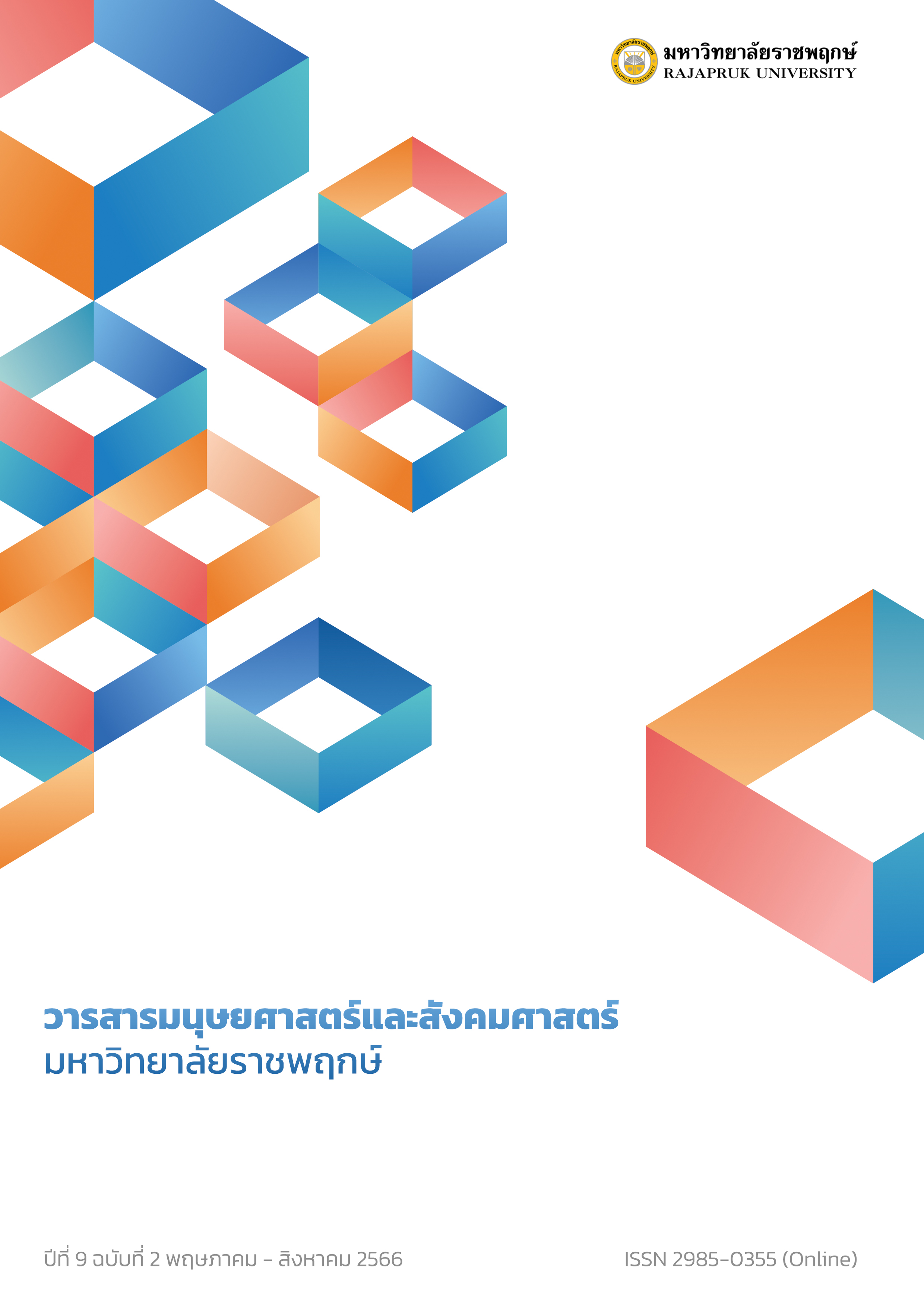Organizational Factors and Motivational Factors in Relation to Teachers’ Performance in Opportunity Expansion Schools in Bangkok Metropolitan Administration
Main Article Content
Abstract
The objectives of this research were to study organizational factors, motivation factors, and the relationship between organizational factors, motivation factors, and teachers’ performance in opportunity expansion schools under the jurisdiction of Bangkok Metropolitan Administration. A sample were 341 teachers selected by stratified random sampling. The research tool was a questionnaire with a confidence level of .981. The statistics used were percentage, mean, standard deviation, exploratory component analysis, Pearson correlation coefficient, and stepwise multiple regression.
The results showed that 1) Organizational factors consisted of 2 components including policy and school administration, and organizational culture. Both components explained about 76.361% of the variance of organizational factors by policy and school administration. The highest component weight was 10.170. 2) Motivation factors consisted of 4 components including perceived support from the organization, relationship with supervisors, self-efficacy, and relationship with colleagues. All 4 components explained the variance of motivation factor about 76.506%. The perceived support from the organization was the highest component weight equal to 22.158. And 3) the relationship among organizational factors, motivational factors, and teacher performance, was found that every pair of variables had a positive correlation with teacher performance. There was a statistical significance at the .01 level. The high-level positive correlation was the relationship between supervisors and perceived organizational support (r=.83) and the high-level positive correlation relatively high was the relationship with colleagues and teacher's performance (r=.80) and 4) Organizational factors and motivational factors related to teachers' performance were found in 4 aspects including relationships with colleagues; recognition of organizational support; organizational culture; and self-efficacy. These were able to predict the performance of teachers in the opportunity expansion schools at 77% with a statistical significance at the .01 level.
Article Details
References
กระทรวงศึกษาธิการ. (2545). พระราชบัญญัติการศึกษาแห่งชาติ พ.ศ. 2545. กรุงเทพฯ: สำนักงานคณะกรรมการการศึกษาแห่งชาติ.
จิตติมา อัครธิติพงศ์. (2556). การพัฒนาทรัพยากรมนุษย์. คณะวิทยาการจัดการ มหาวิทยาลัยราชภัฏพระนครศรีอยุธยา.
ธนวัฒน์ ตั้งวงษ์เจริญ. (2539). แรงจูงใจในการปฏิบัติงานของตำรวจชั้นสัญญาบัตร. วิทยานิพนธ์สังคมวิทยามหาบัณฑิต จุฬาลงกรณ์มหาวิทยาลัย.
ธีรวุฒิ เอกะกลุ. (2543). ระเบียบวิธีวิจัยทางพฤติกรรมศาสตรและสังคมศาสตร. อุบลราชธานี: สถาบันราชภัฏอุบลราชธานี.
นรา สมประสงค์. (2548). การบริหารแบบมีส่วนร่วม. นนทบุรี: มหาวิทยาลัยสุโขทัยธรรมาธิราช.
บุญชม ศรีสะอาด. (2553). การวิจัยเบื้องต้น. พิมพ์ครั้งที่ 8. กรุงเทพฯ: สุวีริยาสาส์น.
ปิ่นประภาภรณ์ กุลสุวรรณ. (2560). แนวทางการพัฒนาผลการปฏิบัติงานของครู โรงเรียนบ้าน บางกะปิ. วารสารทางการศึกษาจุฬาลงกรณ์มหาวิทยาลัย, 12(4): 635–649.
พรชัย เทพปัญญา. (2561). การพัฒนาคุณภาพการศึกษาขั้นพื้นฐานของโรงเรียนในสังกัดกรุงเทพมหานคร. วารสารมนุษย์ศาสตร์ สังคมศาสตร์ และศิลปะ, 11(2): 476–492.
พรทิพย์ ทับทิมทอง. (2558). การวิเคราะห์ผลของการใช้เวลาในการปฏิบัติภาระงานสอนที่มีต่อประสิทธิภาพการสอนของครูในสังกัดสำนักงานคณะกรรมการการศึกษาขั้นพื้นฐาน. วิทยานิพนธ์ ครุศาสตรมหาบัณฑิต จุฬาลงกรณ์วิทยาลัย.
พวงรัตน์ ทวีรัตน์. (2540). วิธีการวิจัยทางพฤติกรรมศาสตร์และสังคมศาสตร์. พิมพ์ครั้งที่ 7. กรุงเทพฯ: สำนักทดสอบทางการศึกษาและจิตวิทยา มหาวิทยาลัยศรีนครินทร์วิโรฒ ประสานมิตร.
ภัคพร เจริญลักษณ์. (2561). วัฒนธรรมองค์การกับการปฏิบัติงานของครูตามมาตรฐานวิชาชีพครู ของสถานศึกษา สังกัดสำนักงานเขตพื้นที่การศึกษามัธยมศึกษา เขต 9. วิทยานิพนธ์ปริญญามหาบัณฑิต มหาวิทยาลัยศิลปากร.
ภุชงค์ บุญอภัย. (2549). ความพึงพอใจในการปฏิบัติงานของข้าราชการครูชายแดนในสถานศึกษาขั้นพื้นฐาน สำนักงานเขตพื้นที่การศึกษาจันทบุรี เขต 2. วิทยานิพนธ์ ครุศาสตรมหาบัณฑิต มหาวิทยาลัยราชภัฏรำไพพรรณี.
ไมตรี จันทรา. (2554). ความสัมพันธ์ระหว่างปัจจัยการบริหารกับระดับแรงจูงใจในการปฏิบัติงานของพนักงานครูเทศบาลเมืองปากพนัง. วิทยานิพนธ์ ครุศาสตรมหาบัณฑิต มหาวิทยาลัยราชภัฏนครศรีธรรมราช.
ลำเทียน เผ้าอาจ. (2559). การทำงานเป็นทีมของข้าราชการครูในโรงเรียนขยายโอกาส อำเภอเมืองตราด สังกัดสำนักงานเขตพื้นทีการศึกษาประถมศึกษาตราด. วิทยานิพนธ์ การศึกษามหาบัณฑิต มหาวิทยาลัยบูรพา.
วรวรรณ เนื่องจำนงค์. (2563). ปัจจัยที่ส่งผลต่อการปฏิบัติงานของครูโรงเรียนมัธยมศึกษา อําเภอศรีราชา จังหวัดชลบุรี สังกัดสํานักงานเขตพื้นที่การศึกษามัธยมศึกษา เขต 18. วารสารบัณฑิตศึกษา, 17(76): 163–170.
วรรณพร แซ่ตัน. (2553). สวัสดิการสำหรับครูในภาวะวิกฤติเศรษฐกิจโรงเรียนสังกัดกรุงเทพมหานครในสำนักงานเขตบางแค. วิทยานิพนธ์ หลักสูตรพัฒนาแรงงานและสวัสดิการมหาบัณฑิต มหาวิทยาลัยธรรมศาสตร์.
วิทัศน์ ฝักเจริญผล และคณะ. (2563). ความพร้อมในการจัดการเรียนการสอนออนไลน์ภายใต้สถานการณ์ระบาดไวรัส COVID-19. วารสารศาสตร์การศึกษาและการพัฒนามนุษย์, มหาวิทยาลัยเกษตรศาสตร์ วิทยาเขตกำแพงแสน, 4(1): 44-61.
วิธิดา พรหมวงศ์. (2564). สภาพปัจจุบัน ปัญหา และแนวทางแก้ปัญหาการจัดการเรียนรู้ ในช่วงการแพร่ระบาดของเชื้อไวรัสโควิด-19 ของโรงเรียน ในสังกัดสำนักงานเขตพื้นที่การศึกษาประถมศึกษานครพนม เขต 1. วารสารรัชต์ภาคย์, 15(40): 200-213.
สมใจ ลักษณะ. (2552). การพัฒนาประสิทธิภาพในการทำงาน. พิมพ์ครั้งที่ 6. กรุงเทพฯ: คณะวิทยาการจัดการ มหาวิทยาลัยราชภัฏสวนสุนันทา.
สมยศ นาวีการ. (2543). การบริหารเชิงกลยุทธ์และนโยบายธุรกิจ. พิมพ์ครั้งที่ 5. กรุเทพฯ: บรรณกิจ.
สุนทรี ศักดิ์ศรี. (2561). ปัจจัยเชิงสาเหตุที่ส่งผลต่อผลการปฏิบัติงานของครู โดยมีพฤติกรรมการเป็นสมาชิกที่ดีเป็นตัวแปรคั่นกลาง. วารสารวิชาการ มหาวิทยาลัยกรุงเทพธนบุรี, 7(1): 125–143.
สำนักงานคณะกรรมการข้าราชการครู. (2544). 21 ปี สำนักงานคณะกรรมการข้าราชการครู. กรุงเทพฯ: สำนักงานคณะกรรมการข้าราชการครู.
สำนักการศึกษากรุงเทพมหานคร. (2564). คู่มือการปฏิบัติงานของสำนักการศึกษา. ค้นเมื่อวันที่ 1 กรกฎาคม 2564, จาก www.bangkokeducation.in.th.
อเทตยา แก้วศรีหา และคณะ. (2558). ปัจจัยที่ส่งผลต่อประสิทธิภาพการสอนของครูผู้สอนหลักสูตรประกาศนียบัตรวิชาชีพในโรงเรียนมัธยมศึกษา สังกัดสำนักงานเขตพื้นที่การศึกษามัธยมศึกษา เขต 32. วารสารวิจัยและพัฒนา มหาวิทยาลัยราชภัฏบุรีรัมย์, 10(2): 57-66.
Alderfer, C, P. (1972). Existence related ness and growth. New York: Free Press.
Cronbach, L.J. (1951). Coefficient alpha and the internal structure of tests. Psychometrika, 16(3): 297-334.
Dianne F. Olivier. (2016). Teacher Personal and school Culture Characteristics in Effective School: Toward a Model of Professional Learning Communicate. Retrieved on May, 15th, 2016, from https://digitalcommons.lsu.edu/cgi/viewcontent.cgi?referer=&httpsredir=1&article=1302&context=gradschool_disstheses
Herzberg, F., Mausner, B., & Synderman, B. (1959). The motivation to work. 2nd ed. New York: John Wiley and Sons.
Mavic Gayomale- Sala. (2020). Motivational Factors in Relation to Teachers’ Performance. Journal of Social Science and Humanities Research, 5(5): 1–26.
Mowday, R., Steers, R.M., & Porter, L. (1979). The measurement of organizational commitment. Journal of Vocational Behavior, 14: 224-247.


